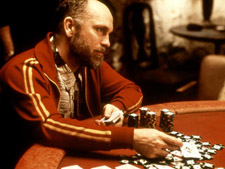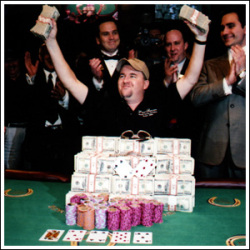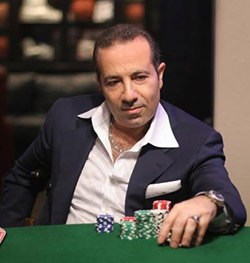The Moneymaker Myth
It’s a cute sentiment, but the idea underlying it reflects a common misconception about the impact (or lack thereof) of Chris Moneymaker’s 2003 World Series of Poker Main Event win.
Chris Moneymaker was not the cause of the poker boom. He was a symptom of it.
The poker explosion was already well underway by the time Moneymaker had bought into the PokerStars satellite tournament that would ultimately shepherd him on his way to the final table.
Since his Main Event win, phrases like “the Moneymaker effect” and “the Moneymaker boom” have entered the venacular of the poker community, but they are often used and understood incorrectly on the basis of what those terms actually connote.
There’s a big difference between being a pioneer or the usher of a new era and being a poster child or sign of the times.
Moneymaker is the latter.
The “effect” refers to a reaction, not a catalyst; Moneymaker was the face of the poker boom, hardly the initiator of it.
Roots
The very first seeds (what Steve Badger calls “the seed of the seed of the seed”) of the nationwide poker boom may have been planted in the late 1980’s, when flop-style poker was first legalized in California and the game made strong inroads into the public consciousness.
 Fast forward about a decade to 1998, when Rounders was released. This Hollywood romanticization of Texas Holdem, starring none less than Matt Damon, Edward Norton, and John Malkovich, drew millions of players to the game—including by his own admission Chris Moneymaker himself—and many of these players served to populate the first online poker games, which rolled out at Planet Poker and Paradise Poker that same year.
Fast forward about a decade to 1998, when Rounders was released. This Hollywood romanticization of Texas Holdem, starring none less than Matt Damon, Edward Norton, and John Malkovich, drew millions of players to the game—including by his own admission Chris Moneymaker himself—and many of these players served to populate the first online poker games, which rolled out at Planet Poker and Paradise Poker that same year.
Either or both of these two elements—the Rounders horde and the easy access and steadily growing popularity of online poker—almost certainly helped put the twinkle in Steve Lipscomb’s eye to found the World Poker Tour in 2002, and ultimately it was the television premiere of the WPT in March of 2003 (which predated Moneymaker’s win by two months) that caused all of these percolating elements to boil over.
 As someone who came to poker just before Moneymaker had the bracelet, and was there to witness the period leading up to it, I can say with certainty (both in my case and in what I witnessed around me) that it was the World Poker Tour broadcasts, not ESPN’s WSOP coverage, that set the world ablaze. The WSOP merely fanned the flames.
As someone who came to poker just before Moneymaker had the bracelet, and was there to witness the period leading up to it, I can say with certainty (both in my case and in what I witnessed around me) that it was the World Poker Tour broadcasts, not ESPN’s WSOP coverage, that set the world ablaze. The WSOP merely fanned the flames.
Moneymaker Or Not…
It’s important to recognize that ESPN had made the decision to greatly expand and reformat their coverage of the World Series of Poker for 2003 long before they knew who the champion would be.
The broadcast of the 2003 series was on a completely different scale than the paltry coverage of previous years. It was this new, far more entertaining, hole-card enabled, reality TV, “story-driven” week-to-week format that sparked the public’s interest, not the eventual champ.
Even those who still want to cite Moneymaker as the father of the boom must concede that he was thrust into the position because of 2003’s newly-expanded coverage, which was driven by 441 Productions (ESPN’s production contractor for the telecasts), specifically Executive Producer Matt Maranz.
He, and Lipscomb, are names that deserve far more credit than Moneymaker’s for poker’s ascendance.
If Sammy Farha had bested Moneymaker in their heads-up battle, I have no doubt that the ensuing months and years would have unfolded about the same way as they did.Who knows, perhaps the same folks who credit Chris Moneymaker’s doughy, everyman “that could be me!” appeal for the explosion of interest in poker would instead be crediting Sammy as the calm, suave, baller that made people say “I want to be him!”
After all, Moneymaker was not the first amateur to win the event. Robert Varkonyi did so just one year prior.
I don’t know, or know of, a single player who names Chris Moneymaker as their personal inspiration for getting into poker, or of any credible source that qualifiably credits him for enlisting any particular mass demographic.
The myth that Chris Moneymaker “started the poker boom” (or that a win from a new hope like 2009’s Darvin Moon could create a neo-boom), is nothing but a meme. It was seeded and spread by pundits soon after the day Moneymaker won, as a way of explaining what was happening. But the explanation ignores reality, and is unsupportable by hard data.
It may be easier to see my point in reverse: is it even possible to competently argue that the poker boom would not have happened if someone besides Moneymaker had won the main event in 2003? I’d challenge anyone to attempt it, with the prerequisite that they acknowledge The World Poker Tour already being the number one show on The Travel Channel when Moneymaker was awarded the bracelet.
The Great Poker Explosion of 2003 was a unique event that occurred due to a confluence of a number of favorable economic, technological, and cultural factors, one of which may have been Moneymaker’s championship run, but one that played a minor role at best.
Explore posts in the same categories: Uncategorized

Leave a comment